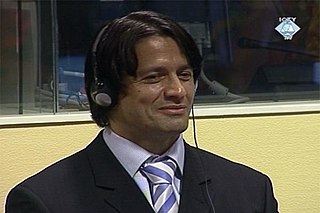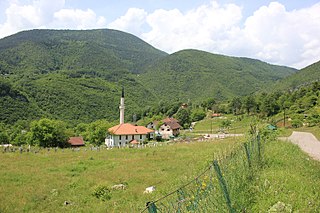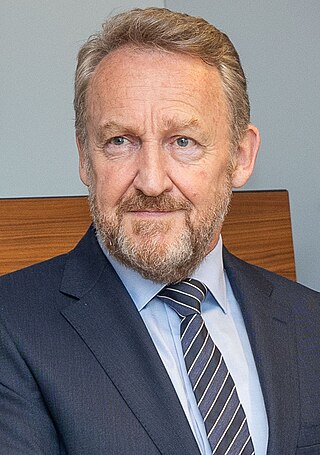
Srebrenica is a town and municipality in Republika Srpska, Bosnia and Herzegovina. It is a small mountain town, with its main industry being salt mining and a nearby spa.

Naser Orić is a former Bosnian officer who commanded Army of the Republic of Bosnia and Herzegovina (ARBiH) forces in the Srebrenica enclave in eastern Bosnia surrounded by Bosnian Serb forces, during the Bosnian War.

The Federation of Bosnia and Herzegovina is one of the two entities composing Bosnia and Herzegovina, the other being Republika Srpska. The Federation of Bosnia and Herzegovina consists of ten autonomous cantons with their own governments and legislatures.

The Bosnian War was an international armed conflict that took place in Bosnia and Herzegovina between 1992 and 1995. The war is commonly seen as having started on 6 April 1992, following a number of earlier violent incidents. The war ended on 14 December 1995 when the Dayton accords were signed. The main belligerents were the forces of the Republic of Bosnia and Herzegovina, the Republic of Herzeg-Bosnia, and the Republika Srpska, the latter two entities being proto-states led and supplied by Croatia and Serbia, respectively.

The Republika Srpska was a self-proclaimed statelet in Southeastern Europe under the control of the Army of Republika Srpska during the Bosnian War. It claimed to be a sovereign state, though this claim was only partially recognized by the Bosnian government in the Geneva agreement, the United Nations, and FR Yugoslavia. For the first six months of its existence, it was known as the Serbian Republic of Bosnia and Herzegovina.

Milorad Dodik is a Bosnian Serb politician serving as the 8th president of Republika Srpska since 2022, having previously served from 2010 to 2018. He also served as the 7th Serb member of the Presidency of Bosnia and Herzegovina from 2018 to 2022.

The Republic of Bosnia and Herzegovina was a state in Southeastern Europe, existing from 1992 to 1995. It is the direct legal predecessor to the modern-day state of Bosnia and Herzegovina.

Žepa is a village located in the municipality of Rogatica, Republika Srpska, Bosnia and Herzegovina. As of 2013 census, it has a population of 133 inhabitants. It is situated northeast of Rogatica itself on the banks of short river with a same name, the Žepa river, which flows into the Drina river nearby, in a valley between the mountains Javor and Devetak.

The Srebrenica Genocide Memorial, officially known as the Srebrenica–Potočari Memorial and Cemetery for the Victims of the 1995 Genocide, is the memorial-cemetery complex in Srebrenica set up to honour the victims of the 1995 Srebrenica massacre. The victims—at least 8,372 of them—were mainly male, mostly Muslim Bosniaks and some Catholic Croats.

The Višegrad massacres were acts of mass murder committed against the Bosniak civilian population of the town and municipality of Višegrad during the ethnic cleansing of eastern Bosnia by Republika Srpska police and military forces during the spring and summer of 1992, at the start of the Bosnian War.

Bakir Izetbegović is a Bosnian politician who served as the 6th Bosniak member of the Presidency of Bosnia and Herzegovina from 2010 to 2018. He is the current president of the Party of Democratic Action (SDA).

The siege of Srebrenica was a three-year siege of the town of Srebrenica in eastern Bosnia and Herzegovina which lasted from April 1992 to July 1995 during the Bosnian War. Initially assaulted by the Yugoslav People's Army (JNA) and the Serbian Volunteer Guard (SDG), the town was encircled by the Army of Republika Srpska (VRS) in May 1992, starting a brutal siege which was to last for the majority of the Bosnian War. In June 1995, the commander of the Army of the Republic of Bosnia and Herzegovina (ARBiH) in the enclave, Naser Orić, left Srebrenica and fled to the town of Tuzla. He was subsequently replaced by his deputy, Major Ramiz Bećirović.
Emir Suljagić is a Bosnian journalist and politician who is currently the Director of the Srebrenica Genocide Memorial. He served as Minister of Education of Sarajevo Canton from 13 January 2011 until 29 February 2012 and was also Deputy minister of Defense from 31 March 2015 to 10 December 2015.

Ethnic cleansing occurred during the Bosnian War (1992–95) as large numbers of Bosnian Muslims (Bosniaks) and Bosnian Croats were forced to flee their homes or were expelled by the Army of Republika Srpska and Serb paramilitaries. Bosniaks and Bosnian Serbs had also been forced to flee or were expelled by Bosnian Croat forces, though on a restricted scale and in lesser numbers. The UN Security Council Final Report (1994) states while Bosniaks also engaged in "grave breaches of the Geneva Conventions and other violations of international humanitarian law", they "have not engaged in "systematic ethnic cleansing"". According to the report, "there is no factual basis for arguing that there is a 'moral equivalence' between the warring factions".
Nož, žica, Srebrenica is a Serbian chauvinist hate slogan that glorifies the Srebrenica massacre of Bosniaks during the Bosnian War. The slogan rhymes in Serbo-Croatian and can be heard at football matches, by members of Serbian nationalist groups Obraz, the 1389 Movement and the Serbian Radical Party and in papers in support of Bosnian Serb General Ratko Mladić.

UDIK, the Association for Social Research and Communications, is the Bosnian non-governmental organization with offices in Sarajevo and Brčko. It was founded in 2013 by Edvin Kanka Ćudić. Organization aimed to gather facts, documents, and data on genocide, war crimes, and human rights violations in Bosnia and Herzegovina and the former Yugoslavia.

Bosnian genocide denial is the act of denying the occurrence of the systematic Bosnian genocide against the Bosniak Muslim population of Bosnia and Herzegovina, or asserting it did not occur in the manner or to the extent that has been established by the International Criminal Tribunal for the former Yugoslavia (ICTY) and the International Court of Justice (ICJ) through proceedings and judgments, and described by comprehensive scholarship.

The siege of Goražde refers to engagements during the Bosnian War (1992–95) in and around the town of Goražde in eastern Bosnia.
















